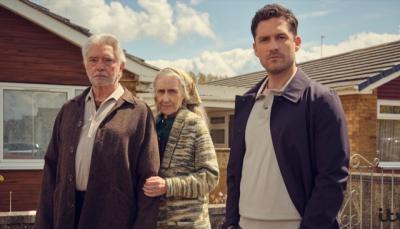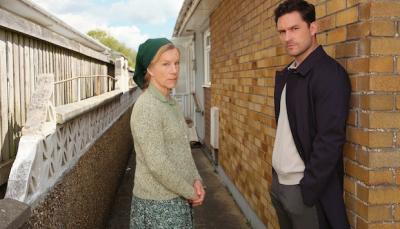'The Long Call': Episode 4 Finale Recap
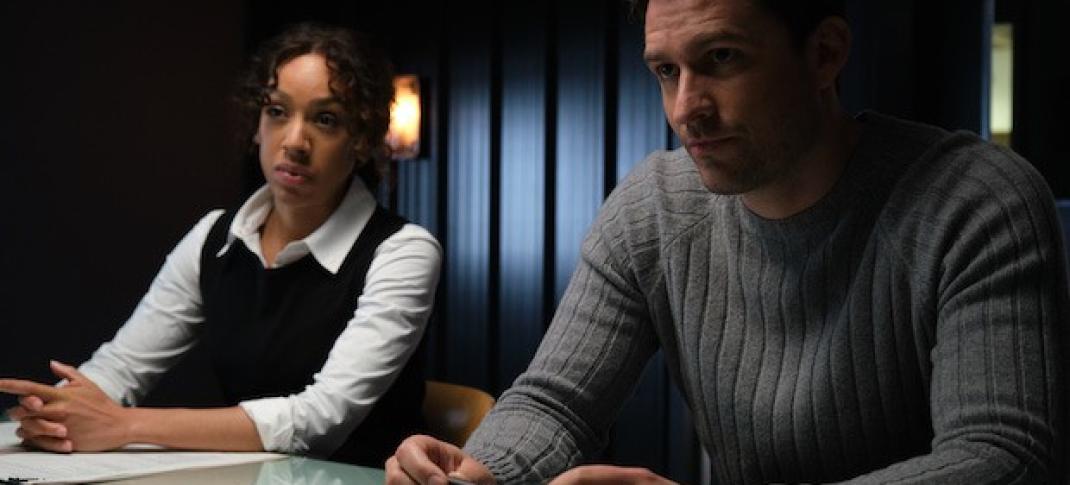
SILVERPRINT FOR ITV THE LONG CALL EPISODE 4 Pictured:BEN ALDRIDGE as DI MATTHEW VENN and PEARL MACKIE as DS Jen Rafferty. This image is under copyright and may only be used in relation to THE LONG CALL.Any further use must be agreed with the ITV Picture Desk. For further information please contact: Patrick.smith@itv.com 07909906963
We’re at the fourth and final episode of Britbox’s The Long Call and Simon’s murderer has still not been found. But we have learned about a lot of other problems and wrongdoing in the community, much of it criminal, all of it obfuscated and kept hidden. And if, like me, you were wrapped up in the relationships––Matthew and Dorothy, Matthew and Jonathan, Jen and her family––take a step back. The whole muddle is becoming more cohesive, and we’re taken back at every turn to the Brethren, with the Woodyard becoming less significant. Or, to be more specific, the spotlight is on Dennis and Grace.
We’ve seen Dennis acting abusively toward Grace. Matthew has seen it too, and he’s tried to talk to her but she’s rebuffed him, convinced that years of being told that she’s fragile and incapable means it’s true. But in this episode we see her consulting a professional, asking for medication. She won’t enter into any sort of therapy because the church doesn’t allow it. But now she knows that something in her life is very wrong.
Chillingly, we see Dennis meet with Gaby, and Grace knows exactly what he’s doing. Gaby has come to talk about Simon’s funeral, but he’s assessing her as another recruit. She’s alone, with her mother in London. How tempted is Gaby by the offer of community, a fresh start, the casting-off of sources of shame? Probably he isn’t aware of her close friendship with Caroline or their plans to raise the baby together. But Grace is concerned enough that she calls Matthew.
Matthew and Grace meet on the rocky shore where Rosa’s baptism took place. She talks about Simon, about his insight, and how he helped her to see the possibilities of life without Dennis. But she’s still evasive about the abuse she’s suffered. Dennis didn’t hit her, she emphasizes. She fears him, but she also believes he’s the first and only person to listen to her. She doesn’t know if Dennis knew Simon had offered her help.
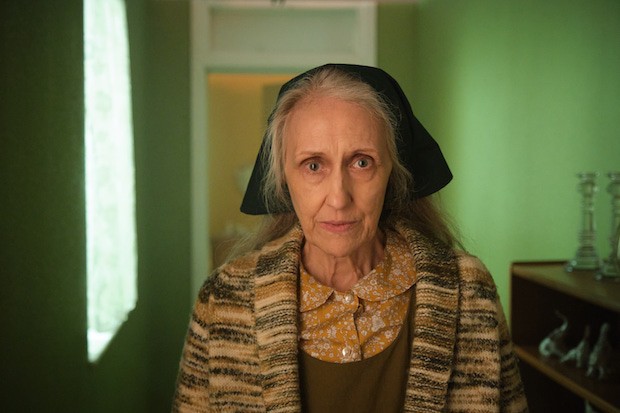
Matthew and Jen interview Ed, who is still looking bewildered and bleating on about how Rosa didn’t say “no.” He admits he did talk to Simon after the rape, and went to the chalet to find his phone, as Rosa reported. Her fall and head injury were the result of an “accident.” But the team has discovered that Ed was fired from his previous position as an accountant, and banned from the profession entirely, after he’d harassed an intern.
Yet another interview with Christopher Reasley reveals that he had been to see Dennis about a “misunderstanding” concerning Rosa. Ed had told him he had made a pass and mistakenly misinterpreted her reaction. So Beasley did what he does best, smoothed it over.
After a long day at work, Jen comes home and almost immediately has to go out again. Grace is to make a statement and Matthew has a search warrant for Dennis’s property. Depending upon what they find, Grace will be taken to a safe house. As he’s brought into the station, Dennis shouts out for Grace, who cowers and covers her ears.
For a while it all looks good––Dennis has a shed where they find the missing phone (and as you know, in a Brit drama, a suspect's shed is a very special place). But he wiggles out of trouble by explaining that he found the phone in the church and didn’t want to be reminded of all the lies the world tells by leaving it there. Worse, he has an alibi for the time of Simon’s death that seems watertight.
Disappointed and worn out, Matthew returns home and tells Jonathan that his mother’s interest was just a ploy to get him back into the Brethren. Jonathan finds it hard to believe; he saw Dorothy trying hard to be friendly, but offers comfort:
... a little Brethren boy with his doubts, who’s just waiting for it to all go wrong, who can’t even hold my hand in public, because he still carries around the shame that his mother taught him. And that’s why you needed to come back here even after you were so brave in getting out, there’s a part of you still felt that shame, and you thought that if she could just see where you are now, if she could just give you her blessing, then you mightn’t feel that anymore. And maybe what you really need is to just let it go.
Reasley and Caroline meet up. She is furious that her father didn’t realize that Rosa had not consented to sex with Ed, and that he’s once again drawn on his position and connections to disengage himself from a crime, just as he had when Caroline’s mother died. Reasley tells her that her mother was sick, and she had grabbed the steering wheel and driven into the tree. He had been trying to protect Caroline. As usual with Reasley you’re wondering what is true, what he believes, and what he invents on the spot.
There’s bad news for Matthew and his team, however. CCTV has tracked Dennis’s movements the morning of Simon’s murder, and he’s been telling the truth. He’s released and Grace, who started to walk home in the dark, gets into Dennis's car (that seemed very ominous). The team go over the case, but still can’t make sense of the many pieces. Matthew goes to see the only person who may know the truth, his mother. She cries and accuses Matthew of making her choose between him and the church, and now she’s lost everything. “What a cruel bastard your god is,” Matthew comments as she falls to her knees.
But Matthew goes to Dennis’s house to make sure Grace is safe. Despite Dennis's usual claim of Grace’s fragility, he lets Matthew inside, and goes on the attack, accusing him of ingratitude after he’d treated him like a son. But Matthew is concerned about Grace and calls out for her. Dennis hits him and he falls down, unconscious.
Grace comes into the room, brandishing a big knife (go, Grace!). She found it in Dennis’s special shed before the police searched it. She rants at him for controlling her life, never allowing her to leave or spend money. He makes the point, naturally, that he’s never hit her. He didn’t need to, she replies, and only Matthew’s return to consciousness stops Grace from stabbing her husband. He arrests Grace for Simon’s murder.
At the station, Grace confesses. Simon had told her he was going to meet Lucy on the beach to take her to the police station, and Grace killed him. But why? Did Dennis make her do it? Tell her to cover up for him? She’s adamant that she murdered Simon but Matthew knows that it was engineered by Dennis’s coercive control through years of abuse. He had persuaded her she was stupid to hope for change, and that Simon was a danger to the church. “Fear makes you so weak,” Grace comments.
So it’s over, a particularly meaningless crime at the end. What will it change? The Brethren will go on as they are, growing vegetables and awaiting the Rapture. Jen admits that she envies their sense of community; she doesn’t have that, although Matthew does. But Jen does have a community, a particularly lovely relationship with her teenage children. When she arrives home she’s all fired up to cook dinner for her kids, until they point out it’s 9:00 pm and the chicken she’s bought is dripping all over the floor. They order Chinese take-out instead.
The next day Jen interviews and charges Dennis. We see a few loose ends tied up. Lucy and her father make their peace, eating fish and chips at the harbor. Her boyfriend Alvy has a new job, and Maurice tells her that she is welcome to invite him––or anyone else––over. There’s no need for secrecy and he’s coming to believe that Lucy can look after herself. As far as the other troubled father-daughter relationship, I’m not convinced at all, but Gaby tells Caroline her father needs to be loved.
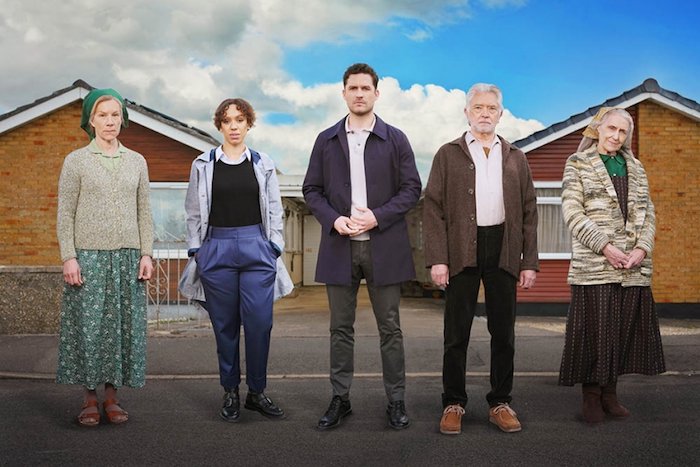
Dorothy is finally freed now Dennis has gone. It’s she who leads the Brethren at Simon’s funeral, announcing that she (and probably everyone else there) has been silent for too long, and that it’s been too easy to say nothing. She, and the others, now have to speak for themselves. Rosa sings Abide with Me; it’s a perfect way to leave the Brethren. Matthew is home, sitting outside and looking at the sea and a spectacularly beautiful sunset. Jonathan taps at the window to summon him inside.
Even with quite a few plot holes along the way, this character-driven drama, with its thoughtful, emotional ending and brilliant acting was immensely satisfying. I was left wanting more––more of Jen and Matthew, of his developing relationship with his mother, and a lot more of that wonderful scenery. The second book in the Two Rivers series, The Heron’s Cry, was released a couple of months ago, so I’m hoping we’ll eventually see an adaptation on our small screens.
What did you think? Let’s discuss.


